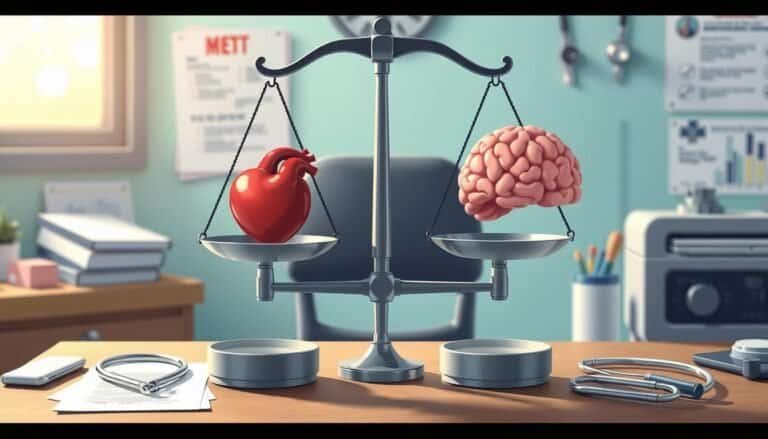The Concept of Free Will in Philosophy
What if everything you thought you knew about making choices was just an illusion? The debate over Free Will in Philosophy has lasted for over two thousand years. It makes us question control, morality, and our existence. Thinkers like Plato, Aristotle, and Kant have looked into the Philosophy of Choice. They wondered if our choices come from our own free will or if they were always meant to happen.
Exploring free will helps us understand human agency and moral responsibility. It’s a fascinating topic that makes us think deeply about ourselves.
Key Takeaways
- The concept of free will has been significant in Western philosophy for over two millennia.
- Philosophers from Plato to Kant have contributed to the discussions on free will and its implications.
- Free will is closely linked to other crucial topics like freedom of action and moral responsibility.
- Various philosophical perspectives, including determinism and libertarianism, shape the discourse around free will.
- Contemporary debates continue to explore the nature of choice and the human experience of freedom.
Understanding Free Will: A Philosophical Definition
The Definition of Free Will means we can make choices and control our actions. This idea sparks debate on whether it’s real or just an illusion. Exploring Free Will Philosophy takes us into deep discussions about ethics, moral responsibility, and how we make decisions.
Philosophers have many views on this topic. Key ideas include:
- Libertarianism: This belief says we can make choices without outside influences.
- Determinism: This idea claims our choices are shaped by past events, so free will doesn’t exist.
- Compatibilism: This approach tries to mix free will with determinism. It says choices can still be made even if they’re influenced.
Weak determinism believes outside factors guide our choices. Soft determinism says our choices are influenced by our traits and things we can’t control.
David Hume’s ideas are important in the free will debate. He believed in a form of free will that fits with moral responsibility and a world where everything is determined. His works, like “A Treatise of Human Nature” and “Enquiry concerning Human Understanding,” highlight the differences between various kinds of freedom and necessity.
The complex nature of the Definition of Free Will leads to big questions about our freedom. It also looks into how it affects our moral responsibility and the challenges in a world where everything is determined.
| Philosophical Stance | Core Belief | Implications |
|---|---|---|
| Libertarianism | Autonomous decision-making | Freedom exists independent of prior events |
| Determinism | All choices are predetermined | Free will is an illusion |
| Compatibilism | Possibility of free will within determinism | Choices can be made despite prior causes |
The Concept of Free Will in Philosophy
The study of the Philosophy of Choice shows a complex world. It’s filled with different views on free will. At the heart is the idea that we can make choices on our own, away from outside forces. This idea makes us think deeply about our actions and their consequences.
In “Free Will and Ultimate Explanation” by Boris Kment, published in 2017, we learn about our moral actions and freedom. It looks into how our past actions might make us think we’re not truly free. Philosophers share their views on what makes an action truly free.
The debate between determinism and indeterminism adds to the Free Will Debate. It talks about if we can blame people for their choices. Compatibilists say free will and determinism can go together. Libertarians believe true freedom means not being controlled by determinism. These views show the deep debate on free will and moral responsibility.
The movie “The Truman Show” from 1998 also explores free will. It shows how our choices might be set before we make them. Through stories from theology and science fiction, we see how complex free will is. This helps us understand our choices and their deep meanings.
Looking into free will in the Philosophy of Choice keeps bringing up big questions. It makes us think about what freedom really means. This debate is key to understanding what makes us human.
Historical Perspectives on Free Will
For centuries, people have debated free will. Philosophers and cultures have shaped our understanding of it. Ancient thinkers first explored the link between our choices and outside forces. Their ideas still influence today’s debates on historical perspectives on free will.
Ancient Philosophers: Plato and Aristotle
Plato believed in the power of self-control for true freedom. He saw freedom as a balanced state where reason rules over emotions and desires. Aristotle, on the other hand, stressed the role of choice in our actions. He linked free will, virtue, and personal responsibility.
These thinkers laid the groundwork for later discussions on free will.
Medieval Contributions: Augustine and Aquinas
In the Middle Ages, Augustine and Aquinas added to the debate. Augustine saw free will and God’s knowledge as intertwined, raising questions about divine influence. Aquinas believed free will was key to moral agency. Their work deepened our understanding of free will, morality, and faith.
| Philosopher | Main Idea | Contribution to Free Will |
|---|---|---|
| Plato | Freedom as self-mastery | Established the foundation for the psychological aspects of free will. |
| Aristotle | Importance of choice | Connected free will with moral responsibility and virtue. |
| Augustine | Divine foreknowledge vs. human autonomy | Explored the coexistence of free will and divine knowledge. |
| Aquinas | Faith and reason | Integrated theological insights with philosophical thought on moral agency. |
Modern Views on Free Will
Modern Views on Free Will show a wide range of ideas from philosophers. During the Enlightenment and today, thinkers have shaped our view of free will. René Descartes and Immanuel Kant were key in this, linking free will to reason and moral law.
Their ideas set the stage for ongoing debates about what free will really means and how it relates to being responsible.
Enlightenment Thinkers: Descartes and Kant
Descartes believed that rational thought is key to free will. He thought humans can choose freely because they are rational. Kant, however, tied free will to moral law. He said true freedom means acting as one should morally.
This mix of reason, choice, and morality is central to Modern Views on Free Will. It has shaped how philosophers think about these topics.
Contemporary Philosophers: Hume and Moore
David Hume and G.E. Moore brought new ideas to free will, focusing on compatibilism. Hume said desires and choices guide our actions, showing free will can exist with determinism. Moore suggested softer definitions of free will, linking it to personal responsibility.
This shift shows how philosophers are rethinking free will. They consider how it fits with determinism and moral responsibility.
Determinism vs Free Will: The Central Debate
Since ancient Greek times, the debate on determinism vs free will has been ongoing. It’s about how much our actions are set in advance versus our ability to choose freely. Determinists believe everything happens because of what came before, which they say means we don’t have free will.
Michael Norwitz explores different views on this topic, focusing on Daniel Dennett and Peter van Inwagen. Van Inwagen thinks free will and determinism can’t go together. He says if we’re morally responsible, which we are, then determinism can’t be true.
Dennett, on the other hand, offers a different view. He redefines what it means to be “up to us” and “responsible.” He says we can act responsibly even if we couldn’t have chosen differently. This idea fits with how we think about teaching morals and judging responsibility today.
René Descartes also added to the debate, seeing the mind as separate from the body. But science now says the mind is just a part of the body. Van Inwagen believes in “agent causation,” saying free will is needed for moral responsibility. He thinks we’re only responsible if we could have chosen otherwise.
In summary, the debate between Dennett and van Inwagen highlights key differences in understanding free will and responsibility. Their views add depth to the ongoing discussion in philosophy and science.
| Philosopher | Main Argument | View on Moral Responsibility |
|---|---|---|
| Peter van Inwagen | Free will is incompatible with determinism | Moral responsibility requires the possibility of doing otherwise |
| Daniel Dennett | Responsible actions can exist even without alternative choices | Emphasizes moral education and complexity in determining responsibility |
| René Descartes | Mind is a distinct entity from physical processes | Belief in moral responsibility grounded in conscious choice |
Compatibilism: Reconciling Free Will and Determinism
Compatibilism is a key idea that tries to link free will and determinism together. It says we can be blamed for our actions even if everything was predetermined. This view is important for understanding how we make choices despite the forces that shape our actions.
Understanding Soft Determinism
Soft Determinism, also known as Compatibilism, believes free will and determinism can coexist. It says our actions might be set by past events, but we still make choices based on what we want. Being able to choose what we value is key to being responsible for our actions.
Key Advocates of Compatibilism
Many philosophers have explored Compatibilism, offering new insights on free will and determinism. Some of the main supporters of Compatibilism include:
| Philosopher | Key Contributions |
|---|---|
| G.E. Moore | Emphasized the importance of intentions in moral reasoning. |
| Harry Frankfurt | Developed the concept of “Frankfurt cases” to illustrate that moral responsibility does not depend on the ability to do otherwise. |
| Daniel Dennett | Argued for a coherent understanding of free will that allows for human agency within a deterministic world. |
| John Fischer | Focused on the significance of reasons-responsiveness for moral responsibility. |
| Kit Fine | Explored the metaphysical implications of choices in a deterministic framework. |
| Linda Sartorio | Contributed to discussions about the implications of control and moral accountability. |
Most Compatibilists believe free will means acting on our desires without being forced. This view matches the idea that both determined and free actions can happen at the same time. Compatibilism shows us how free will can still exist even if everything is predetermined.
Incompatibilism: The Libertarian Perspective
Incompatibilism says that free will and determinism can’t both be true. It points out that if everything is determined, then we can’t really make choices freely. Libertarians believe in indeterminism, meaning our choices can happen without being set by something else.
The Indeterministic Approach
Carl Ginet and Hugh McCann question the usual ideas of cause and effect. They think free actions don’t need a cause. They say free actions could be either uncaused or caused in a way that’s not predictable.
This idea helps us think about free will, but it raises questions. For example, what does it mean to act freely? How do we control our actions if they’re not caused by anything?
Noncausal theories try to explain free will by looking at control and intention. They aim to show how we can act for reasons and still be free. Ginet believes there are specific conditions that must be met for an action to be truly free.
The Libertarian Perspective believes free will and determinism can’t go together. They agree with compatibilists that free will exists but think it can’t exist if everything is predetermined. Some people misunderstand libertarianism, thinking it means actions have no cause.
But libertarians actually support different types of causality. They face challenges, like the problem of luck, which questions if uncaused actions are truly free. Despite this, they believe freedom is possible when choices come from our own beliefs and desires.
Free Will and Moral Responsibility
The link between free will and moral responsibility is a big topic in philosophy. It makes us think about if we can blame people for their choices if they have free will. We believe in moral agency because we think people can choose their actions freely.
The Connection Between Freedom and Ethics
In Ethics, having free will is seen as key to being morally responsible. Without the ability to choose, we can’t really be blamed for our actions. John Fischer believes that even if everything is determined, we can still be morally responsible. This idea questions the old beliefs by saying we don’t need complete freedom to make choices.
Debates on Moral Agency and Accountability
There are many views on moral agency, especially about determinism’s effects. Some think that if everything is set, we can’t really choose. Others say that being responsible can still exist, even if we can’t control everything. They suggest we need to look at actions and reasons differently.
There are strong arguments against free will in a set world. But, there are also views that try to mix free will and determinism together. This keeps the idea of moral responsibility alive.
Existentialism and Free Will
Existentialism deeply explores free will, showing how important human choice is. People have radical freedom, which means they make choices that can feel both freeing and hard. This idea came up in mid-twentieth-century France, after big events like World War II and the atomic bombings. These events made people think more about how they make choices in a world that’s not always certain.
The Radical Freedom of Choice
Existentialism says that we exist first, and then we figure out who we are through our choices. Jean-Paul Sartre believed this strongly. He said humans are “condemned to be free,” meaning we can’t avoid making choices. This shows the big responsibility that comes with being free.
Sartre’s Perspective on Freedom
Sartre’s ideas about free will are key to existentialism. He thought people can change their lives, even if things seem hard. He talked about “bad faith,” where people lie to themselves or others about their feelings and what’s real. For example, a clergyman might keep believing in their faith even if they don’t really believe anymore. This shows how complex and tricky making choices can be.
Contemporary Scientific Insights on Free Will
Today, we explore free will at the crossroads of philosophy, neuroscience, and psychology. These fields challenge old ideas, offering a new look at how we make choices. Researchers are uncovering the hidden workings of our minds, leading to fresh thoughts on our freedom, responsibility, and choices.
Empirical Arguments Surrounding Free Will
Studies from different fields show us how free will works, making us question determinism and consciousness. Key findings include:
- Neuroscience shows that our brains start making decisions before we even know we’ve decided, hinting at a hidden influence on our choices.
- Psychology links free will to self-control, showing that our beliefs about free will can lead to kinder actions.
- Philosophers debate the impact of neuroscience on free will; some say it weakens the idea, while others believe it fits with our autonomy.
- Theology also weighs in, seeing free will as key to moral responsibility and ethics.
Many people believe in compatibilism, thinking free will can exist even if everything is predetermined. Yet, there’s little link between free will beliefs and determinism. Projects like the Big Questions in Free Will show a big interest in this topic, bringing together experts from philosophy and science.
Some, like Ariel Furstenberg, argue neuroscience doesn’t prove free will is false. Emily Willoughby stresses the need for clear definitions. James B. Miles questions free will based on traditional freedom ideas. Studies, including those at Florida State University, show how people see free will differently in different situations.
In conclusion, modern science and philosophy offer a complex view of free will. They blend research with debate, aiming for a deeper understanding of this complex topic.
Conclusion
The study of free will in philosophy is complex, filled with debates from centuries past. It covers ideas from ancient thinkers like Plato and Aristotle to modern minds like David Hume and G.E. Moore. Their thoughts help us understand the deep questions about free will, moral responsibility, and ethics.
Today, debates between compatibilism and incompatibilism are key to understanding free will. Some believe free will and determinism can work together. Others think they can’t. These debates are shown through arguments like the consequence and luck arguments, which highlight the problems of free will in a determined world.
The idea of free will is complex and still evolving. Recent studies, as shown by Joshua May, are helping us learn more. By combining philosophy with science, we’re having a deeper conversation about our choices and moral actions. This encourages us to think differently about our moral agency with new knowledge.
Source Links
- Free Will
- Free Will | Internet Encyclopedia of Philosophy
- Free will | Definition, Determinism, & Facts
- What Is Free Will? | Issue 159
- Hume on Free Will
- Free will
- The problem of free will and determinism
- There’s No Such Thing as Free Will
- The History of the Free Will Problem
- "Free Will"
- Libertarian Free Will: Contemporary Debates
- Free Will and Neuroscience: From Explaining Freedom Away to New Ways of Operationalizing and Measuring It
- Free Will vs Determinism – Orion Philosophy
- Free Will and Determinism | Issue 1
- Compatibilism
- Reconciling Determinism and Free Will: A Compatibilist Perspective
- Incompatibilist (Nondeterministic) Theories of Free Will
- “Libertarian Free Will”: How to Avoid Some Confusions – The London Lyceum
- 6.4 Free Will – Introduction to Philosophy | OpenStax
- dfwFischer2
- Free will and moral responsibility | Definition, Theories, & Facts
- Free Will and Moral Responsibility
- Existentialism
- Existentialist view of free will and responsibility
- Existentialism – Routledge Encyclopedia of Philosophy
- Is There Such a Thing as Free Will? – Consensus: AI Search Engine for Research
- Free Will — International Society for the Science of Existential Psychology
- The Impact of Neuroscience on the Free Will Debate – Florida Philosophical Review
- Microsoft Word – may-concept-free-will.rtf
- Free Will in the Real World … and Why It Matters • Richard Carrier Blogs
- Freedom of the Will







